"It's like an onion," my good friend in Sicily warned. "You peel back the layers, only to find another one underneath." He was right.
When it comes to reporting on the mafia and anti-mafia in Sicily, I underestimated the depth of the rabbit hole I would go down.
While most mafia bosses are behind bars these days and their bloody violence subdued, its culture of favours and personal interest lingers on.
So in Sicily, nothing is ever quite what it seems. Like being inserted into a plot line of the Sopranos, it would be hard to distinguish good from evil in the strange series of events that happened after I met Pino Maniaci.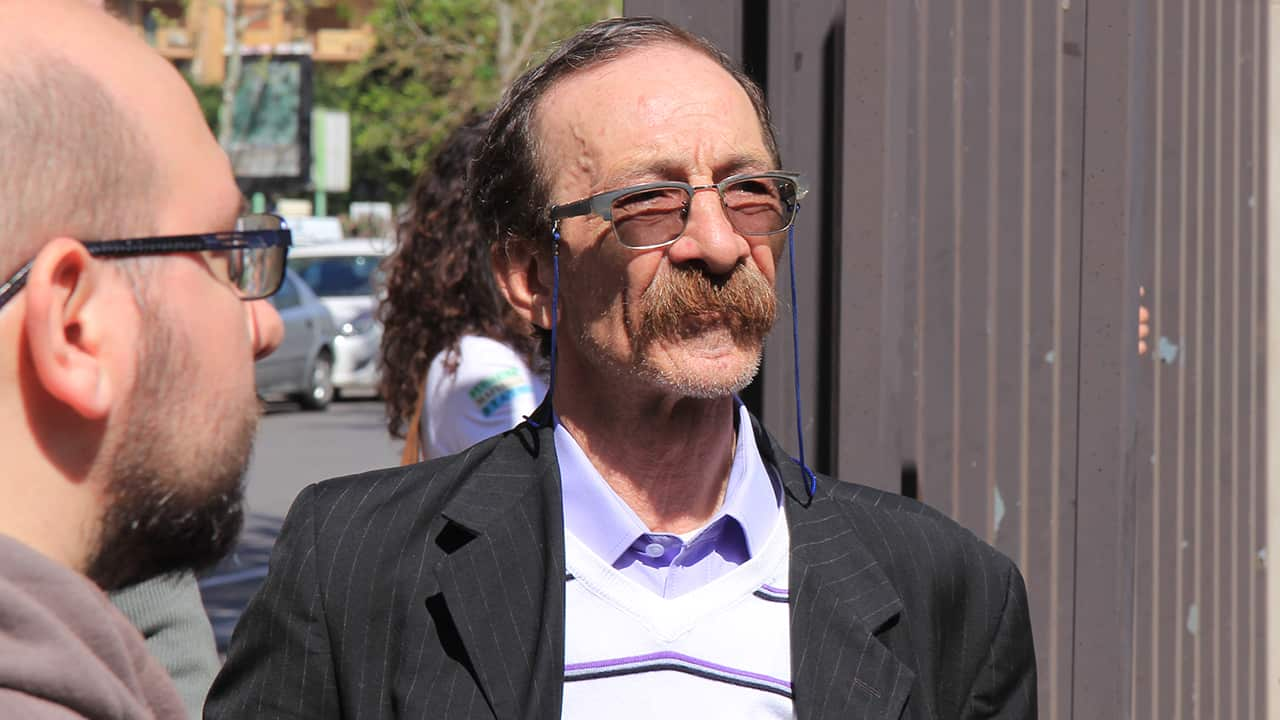 The premise for was simple: a guy who runs an anti-mafia TV station, bravely standing up to those renowned for extortion and violence. But from the get-go something didn't seem right.
The premise for was simple: a guy who runs an anti-mafia TV station, bravely standing up to those renowned for extortion and violence. But from the get-go something didn't seem right.

Pino Maniaci is one of Sicily's most outspoken anti-mafia journalists. Source: SBS Dateline
I had already seen Pino portrayed by other media: his bombastic re-enactment of being strangled by a mafioso's son, the carcass of his burnt out car and heart wrenching photos of his beloved dogs hanged outside his TV station.
He said these were all ways the mafia tried to silence him. But most of what he recounted I’d heard before – sometimes word for word. I couldn’t help but sense a well-rehearsed act. It quickly became clear this was all part of ‘the Pino show’.
I wanted to dig deeper. What was in it for him? How does someone like him survive for over 15 years if he is really a threat to the mafia?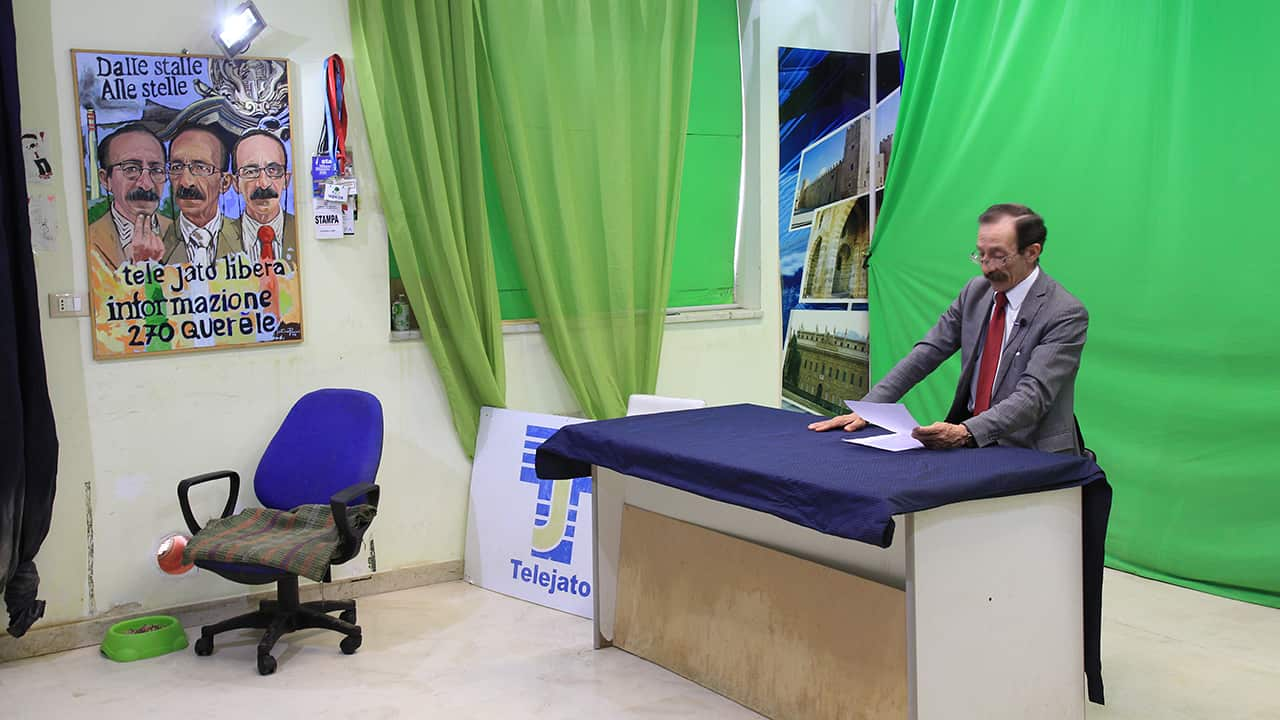 Sicily’s history is riddled with the brutal murders of hundreds of anti-mafia police, judges and journalists. So how had Pino Maniaci lived through his outspoken broadcasts?
Sicily’s history is riddled with the brutal murders of hundreds of anti-mafia police, judges and journalists. So how had Pino Maniaci lived through his outspoken broadcasts?

Pino Maniaci in the Telejato studio, with some of the artwork dedicated to him on the wall. Source: SBS Dateline
Pino's allure lies in the fact that he's a loveable rogue. His chain smoking and colourful language make for good television, and he knows it.
During our filming, Pino wanted to call all the shots. What we should film, when we should film it. He paraded his caribinieri (military police) escort in front of us at a coffee shop, yet would turn up to cover a story in Palermo with no protection in sight.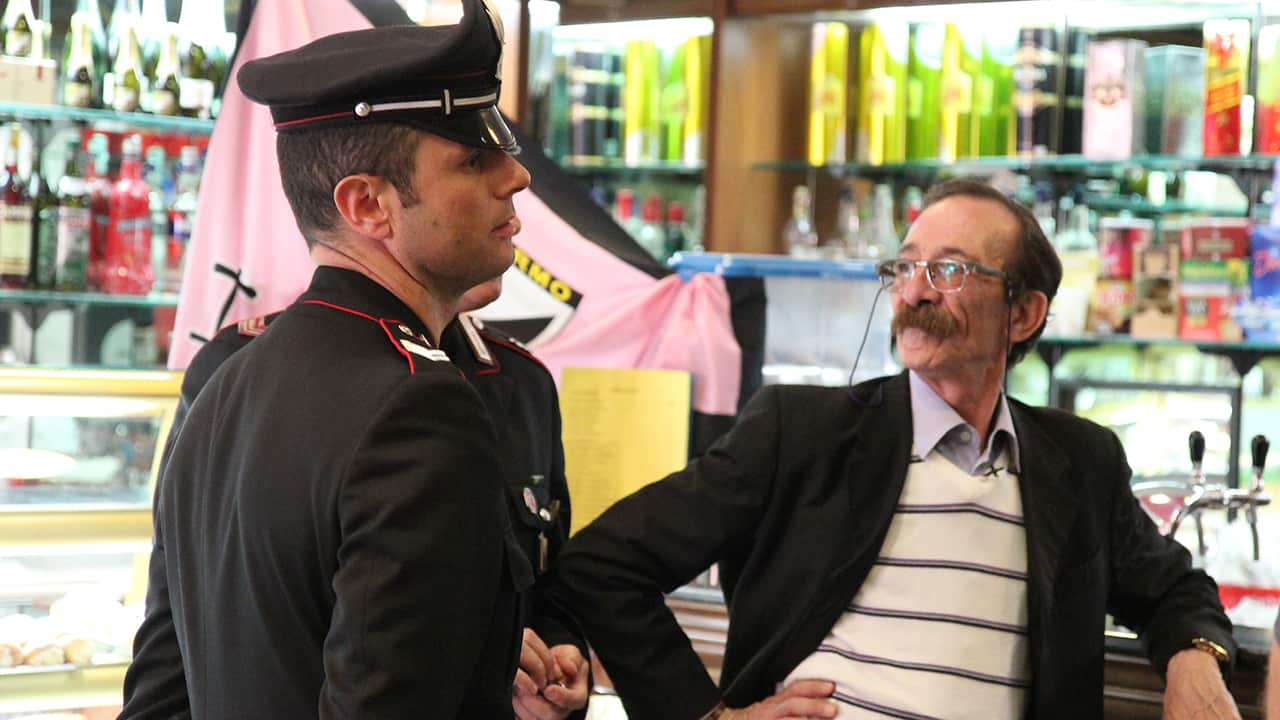 Other behaviour raised questions. While filming he made lewd jokes towards some of the women he encountered – including students. He embarrassed a schoolgirl on excursion at his station by insinuating she had the right physical assets to read the news on TV.
Other behaviour raised questions. While filming he made lewd jokes towards some of the women he encountered – including students. He embarrassed a schoolgirl on excursion at his station by insinuating she had the right physical assets to read the news on TV.

Pino with the police escort he was given after his dogs were killed. Source: SBS Dateline
Over lunch at his home, he made a blatant sexual innuendo towards a young woman in our crew and referred to his wife in terms so disparaging that it bears not repeating.
While easy to dismiss this kind of chauvinism, I started to think there might be a deeper link to what I was trying to cover - the modern mafia and what sustains it in Sicily.
It started to become clearer when I met Nino Di Matteo, the chief prosecutor in Italy's ‘trial of the century’. He's the first to put mafiosi on trial along with police and politicians accused of colluding with them.
Di Matteo is the most threatened man in Italy and has spent the last 20 years under heavy guard, unable to live a normal life.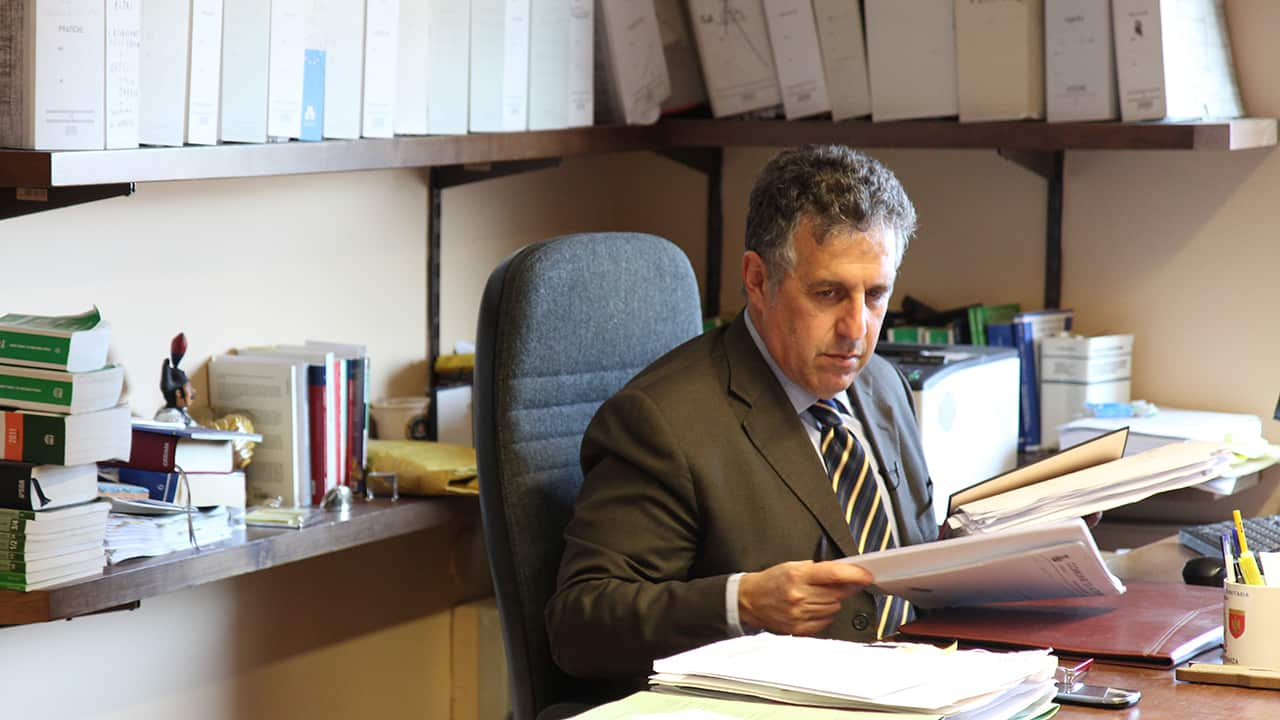 He looks beyond the visible signs of mafia affiliation. His decades of uncoiling its institutional layers have convinced him that the root cause of the mafia lies in a certain mentality.
He looks beyond the visible signs of mafia affiliation. His decades of uncoiling its institutional layers have convinced him that the root cause of the mafia lies in a certain mentality.

Prosecutor Nino Di Matteo has more than 20 bodyguards looking after him around the clock. He can’t leave his heavily fortified office, or his home. Source: SBS Dateline
As he put it, "a culture of peddling favours, of cronyism, of lobbies, of political affiliations, and the privilege to satisfy personal interests in life."
The next layer of the onion was revealed the day after we finished filming, when Pino made national headlines.
An Italian newspaper released police wiretaps alleging it shows him accepting money from a Sicilian mayor, saying, "I warned you, and you go on making mistakes."
Pino denies it was extortion and says the money was owed for advertising on his station. He dismisses it as another attempt to silence him. He’s since launched legal action, arguing the video is misleading. Pino was in even trickier territory with another wiretap, an alleged phone call between him and a woman who he calls “darling”. In it, he seemed to suggest that it was, in fact, her jealous husband who killed his dogs and that he would frame it as a mafia plot to silence him.
Pino was in even trickier territory with another wiretap, an alleged phone call between him and a woman who he calls “darling”. In it, he seemed to suggest that it was, in fact, her jealous husband who killed his dogs and that he would frame it as a mafia plot to silence him.

Pino Maniaci reads one of his anti-mafia bulletins at the Telejato studio. Source: SBS Dateline
"Darling, all hell will break loose," he told her. "They'll give me a police escort."
In a press conference that he scheduled for himself, Pino said he was lying to the woman on the phone to try to impress her. He asked male reporters to sympathise with his plight. "Haven't you been in a similar position?" he appealed to them.
If, like me, you need a recap of his complicated argument: Pino claims he was lying when saying he'd lie about the mafia killing his dogs. Therefore, not lying?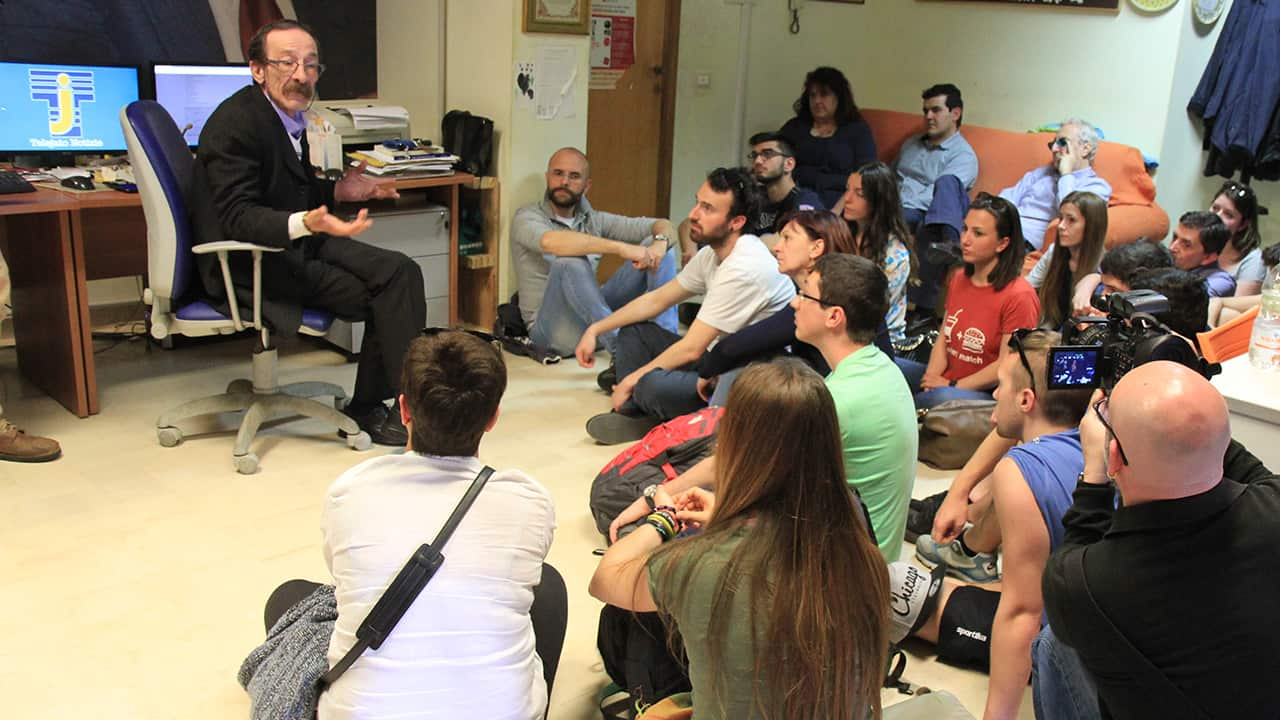 In his defence, many people in Sicily sing Pino's praises for helping to end the mafia's culture of silence that had infected the public for so long. For years, he has been loudly speaking out against local level corruption.
In his defence, many people in Sicily sing Pino's praises for helping to end the mafia's culture of silence that had infected the public for so long. For years, he has been loudly speaking out against local level corruption.

Pino Maniaci speaks about the mafia to a group of students visiting his TV station. Source: SBS Dateline
But love him or hate him, believe him or not, Pino Maniaci seems to tread a fine line between fighting mafiosi and behaving like one.
He even admits, "I would have become a good mafioso, a charismatic one, of course. It’s about where you are born, in what type of environment you live, the culture that you breathe."
I'm left with the sense that Sicily's mafia/anti-mafia struggle is not a decisive one. While the mafia no longer kills openly on the streets, the mentality that nourishes it is alive and kicking: one of a chauvinistic patriarchy that favours cronyism and the murky pursuit of personal interest.


